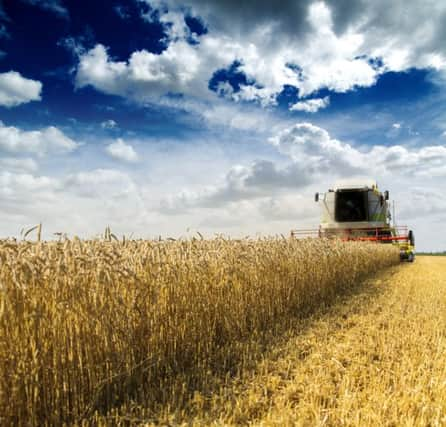Bill Jamieson: Reasons to be cheerful despite doom and gloom


It’s impossible to listen to any news broadcast these days without becoming even more depressed. Is there anything going right in this country?
David Owen, chief European financial economist for Jefferies, warns us the UK could be in for a rough ride: “Recent weeks have seen growing signs of the wheels coming off the UK recovery, with real incomes squeezed by the decline seen in real wages.”
Advertisement
Hide AdAdvertisement
Hide AdAnd Martin Beck of Oxford Economics says their research suggests a long-run hit to the economy with a gradual cumulative effect. By 2030, the UK, he reckons, will have missed out on three to four per cent of growth.
Yet amid all this, there is hope that the worst of the doomsayers’ warnings can be averted. That may not sound much like good news. But when the politicians are at each other’s throats and we are warned almost daily of our grim prospects, we should take comfort where we can.
Even in the past week there have been reasons for encouragement – not that you would hear much of them from a broadcasting commentariat that seems determined to make the worst of everything.
Not all that long ago, the overriding concern was the dire state of the public finances. Every month brought bleak figures on the budget deficit – either coming down slower than forecast or not coming down at all.
But last week brought news of improvement – not only on the monthly tally, but also that previous deficit estimates had been scaled down.
Public sector net borrowing (leaving out public sector banks) was down 5.6 per cent last month on the level a year ago, at £6.7 billion. Moreover, April’s shortfall was trimmed to £9.4bn from a previously reported £10.4bn and the total for the 2016-17 financial year was cut from £48.7bn to £46.6bn.
Helping last month’s figures was a 5.1 per cent year-on-year increase in tax receipts and in particular record levels of VAT receipts for the month – up 4.3 per cent year-on-year to £11.2bn.
A late Easter and warm weather were cited as reasons. But I suspect it had more to do with the continuing rise in numbers employed, with UK employment at a record high of 74.8 per cent and unemployment at a low of 4.6 per cent. The lowest paid have also been spared a worse squeeze by rises in the minimum wage and in the personal allowance, helping their incomes rise by some 10 per cent since 2010.
Advertisement
Hide AdAdvertisement
Hide AdMuch has been made of the uncertain outlook for heartland manufacturing. But looking at both export and total order books, the gloom so far may have been overdone. The CBI’s latest Industrial Trends Survey shows that both strengthened to multi-decade highs in June. Its survey of 464 manufacturers found that total order books climbed to the highest level since August 1988, underpinned by a broad-based improvement in 13 of the 17 sub-sectors, led by the food, drink & tobacco and chemicals sectors. Export orders also improved to a 22-year high, hitting similar peaks to those seen in 2011 and 2013.
Meanwhile, Catherine Mann, OECD chief economist, says global growth is projected to rise modestly from three per cent in 2016 to just over 3.5 per cent by 2018. “The mood in the global economy has brightened during the past year, with confidence indicators and industrial production increasing, and investment and trade picking up from low levels,” she says. “Growth is broad-based, including among major commodity producers.”
The UK’s current account deficit narrowed notably in the first quarter of the year. And it was this improved outlook that was cited by Bank of England chief economist Andrew Haldane in his hawkish remarks about interest rates. “There are early-stage signs,” he said last week, “that global growth may be rebalancing away from consumption and towards investment” – the earnest wish of mainstream economic commentators for years.
Finally, Scotland’s agriculture sector is showing signs of growth, despite all the uncertainty. Analysis by Clydesdale Bank found total income from farming, having fallen from £775 million in 2014 to £653m in 2015, looks to have recovered to £749m on the bank’s latest estimates.
It said its own lending figures to the sector showed a 15 per cent increase last year, adding that the industry had shown “great resilience”. The report found that 2017 also looked “positive” as a result of the fall in sterling following the Brexit vote.
While pro-Brexit economist Professor Patrick Minford of Cardiff University confesses that he underestimated the sterling devaluation post the EU referendum, he argues that the 15 per cent fall “isn’t necessarily a bad thing”.
Having a devalued pound boosts demand for exports, he argues. Businesses invest more money because they can sell more easily abroad. And more expensive foreign goods encourage consumers to buy British, giving an extra push for business investment.
Beck of Oxford Economics also says that being outside the customs union with the EU may bring benefits. Trade with the EU may not be as important as building trade links with rapidly growing large economies such as China and India, he says. Even before Brexit, exports to the EU had been falling relative to other markets. China and India are “growing very quickly”, whereas European countries are wealthy and so are growing more slowly as a market.
Advertisement
Hide AdAdvertisement
Hide AdNone of this mitigates the deep political uncertainties that lie ahead, or a slowdown in growth or continuing pressure on household incomes. But Neil Veitch, fund manager at Edinburgh-based Scottish Value Management, argues that while the politics of protest against the status quo have been on the rise, “incumbents need to offer a broad policy agenda which can generate hope, rather than a narrow, insular one”.
Amen to that. We have much to worry about. But let’s not talk ourselves into a worse state of affairs.